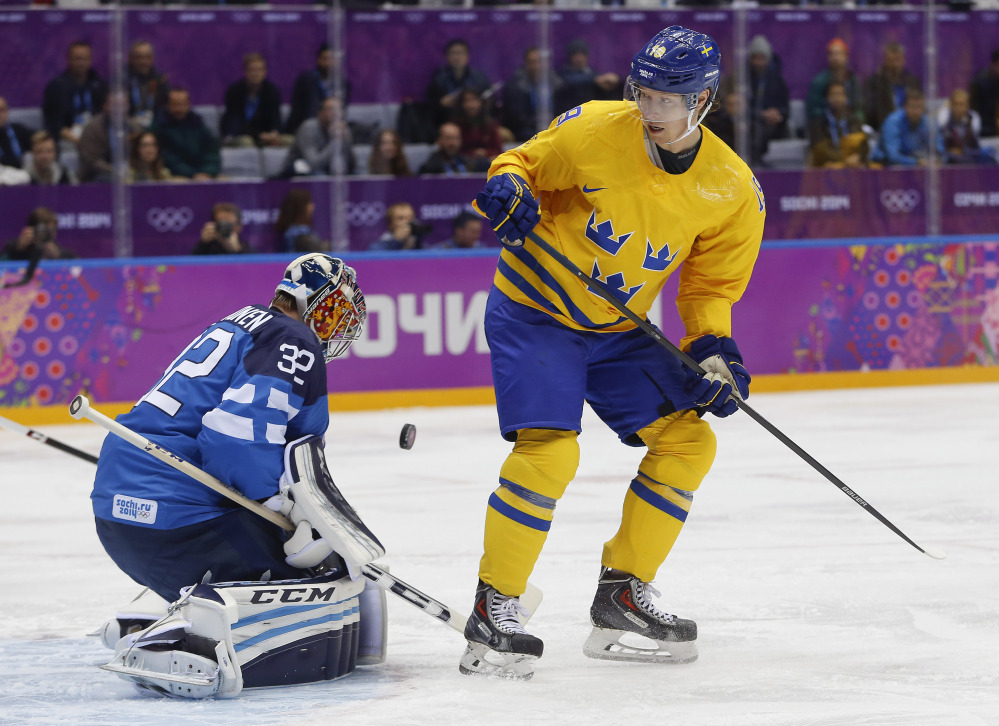SOCHI, Russia — Sweden center Nicklas Backstrom watched from the athletes village as his teammates lost to Canada in the Olympic hockey gold-medal game because he failed a doping test for a substance found in an allergy medication.
“I was ready to play the biggest game of my career,” Backstrom said Sunday after the Canadians beat the Swedes 3-0. “And two and a half hours before the game, I got pulled aside.”
Backstrom paused, choked with emotion and appeared to be on the verge of tears.
“It’s sad,” he said.
The Swedish hockey team, meanwhile, was simply mad at the International Olympic Committee.
“We are all very upset,” said Tommy Boustedt, the team’s general manager. “Our opinion is that IOC has destroyed one of the greatest hockey days in Swedish history.”
Boustedt lashed out at the IOC about the timing of its decision, saying it was “political” because it would make news.
The governing body refused to fire back.
“We will not comment on any potential process until it has concluded,” IOC spokesman Mark Adams said.
The International Ice Hockey Federation is taking the silver medal that would have been given to Backstrom in the postgame ceremony to its offices in Zurich while it waits for the IOC to decide whether it can be sent to Backstrom, according to IIHF spokesman Adam Steiss.
Backstrom was punished more than another player was in the same situation four years ago.
While playing for Slovakia at the 2010 Olympics, defenseman Lubomir Visnovsky tested positive for the same banned substance — pseudoephedrine — and was only reprimanded by the IOC because it said he declared on his doping control form that he was taking the medication.
Backstrom, likewise, said he hasn’t hid the fact that he takes the substance that is banned by the IOC during competition and was told by his Olympic team doctor he could take one pill a day without possible penalty.
He was tested on Wednesday after helping the Swedes beat Slovenia in the quarterfinals. He was pulled out of Sweden’s locker room four days later, just two-plus hours before the Sochi Games finale, and was informed he couldn’t play.
The Washington Capitals standout was supported by his Olympic team, NHL franchise, NHL Players’ Association and the IIHF.
“I am convinced that Nicklas and the NHLPA will take this further,” Boustedt said in Swedish during a news conference that lasted about 40 minutes.
NHL Deputy Commissioner Bill Day issued a statement saying the substance Backstrom tested positive for is not on the league’s list of banned substances.
“We do not anticipate there being any consequences relative to Nicklas’ eligibility,” Daly said.
The Capitals sent out a statement saying Backstrom has been taking the allergy medication intermittently for seven years, including this season, to cope with severe allergies.
“The test was done on Wednesday and he was pulled out two hours before a game on Sunday, I think that’s certainly flawed,” NHLPA special assistant Mathieu Schneider said.
Dr. Mark Aubry, chief medical officer of the IIHF, said Backstrom provided information correctly to the IOC about the medication he was taking.
“He is the innocent victim of circumstances,” Aubry said.
Backstrom’s suspension from the gold-medal game may be a point of contention when the NHL and NHLPA negotiate with IOC about whether to let their players participate in the 2018 Olympics.
He was listed in the team lineups distributed before the game, and his teammates later found out he wouldn’t be with them on the ice.
“It’s too bad he couldn’t play,” Sweden winger Carl Hagelin said. “We lost a really good player.”
Backstrom is the sixth athlete to fail a doping test at the games. Five of the six, including Backstrom, tested positive for minor stimulants that are often found in food supplements.
“They need examples to scare cheaters with, Nick is not one of them,” Boustedt said. “And, that’s why it’s awful.”
Send questions/comments to the editors.



Comments are no longer available on this story